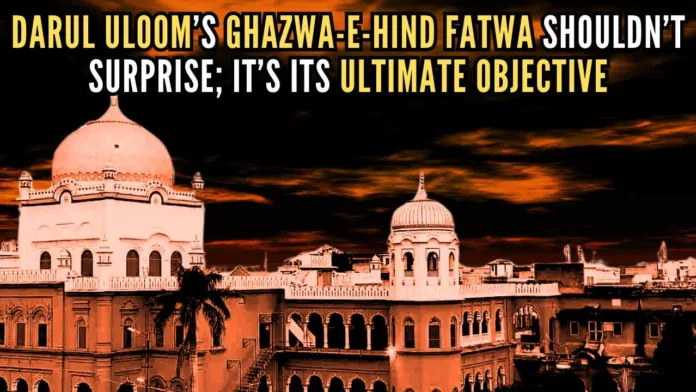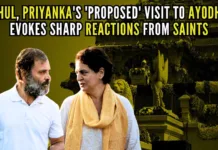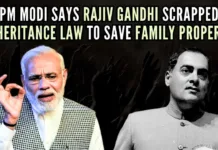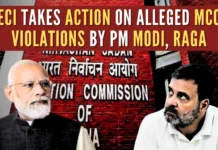
Fatwa “anti-national”
On February 22, 2024, Darul Uloom Deoband, one of the leading Islamic seminaries in Bharat, reportedly issued a fatwa that gave validity to the idea of Ghazwa-e-Hind. The seminary has, in fact, written on its website that “Ghazwa-e-Hind” (read holy raid of Bharat) is “valid from the Islamic point of view”. It also stated that “those martyred in Ghazwa-e-Hind will be great supreme martyrs.”
File photo
A report in this regard further said: “It’s mentioned in the fatwa that a hadith has been narrated quoting Hazrat Abu Huraira, who was close to Prophet Mohammad. In this, he spoke of Ghazwa-e-Hind and said, ‘I will fight for it and will sacrifice all my wealth for it. If I die, I will be a great sacrifice. If I remain alive, I will be called ‘Ghazi’ (a Muslim warrior).”
The fatwa evoked a sharp reaction with the National Commission for Protection of Child Rights (NCPCR) taking up the issue. Its chairman Priyank Kanungo lodged a complaint with Saharanpur district officer Dinesh Chandra, who ordered the Sub-Divisional Magistrate (SDM) and Senior Superintendent of Police to “take action after investigation”.
The complaint of Kanungo, which termed the fatwa “anti-national”, inter-alia, read: “At Darul Uloom Deoband, children are being taught how to perform ‘Ghazwa-e-Hind’, Whoever gives his life for Ghazwa-e-Hind will be called the supreme martyr. This organization operates madrassas throughout South Asia. It is very dangerous to incite children to attack India in this way. We have asked the district administration to register a case under sections of treason.”
Significantly, Darul Uloom Deoband defended the fatwa. It reportedly cited in its defence “Sunan an-Nasai”, one of the “Kutub al-Sittah” (six major hadith collections). It said that “there is an entire chapter in it regarding Ghazwa-e-Hind”[1].
Ghazwa-e-Hind is Darul Uloom’s ultimate goal
It needs to be underlined that it was in 1867 that the Deoband divines founded Dar-ul-Uloom (House of Learning) at Deoband in the Saharanpur district of the then United Provinces. It was established under the guidance and inspiration of Maulana Mohammad Qasim Nanawtawi in the wake of the Muslim defeat at the battlefield of Shamli in 1857 at the hands of the British as a counterpoise to Sir Syed Ahmad Khan’s west-oriented Aligarh movement, along with advancing the Hanafi School of theology. It was used to impart instructions in Islamic history and other old-fashioned disciplines. The Deoband divines also set up Jamiat-Ulama-i-Hind in 1919 to play a “more important role in the Khilafat movement and enter the political field in their own right.”
Aims and objectives of Jamiat Ulama-i-Hind
The aims and objectives of the Jamiat Ulama-i-Hind were “to defend Islam, Islamic rituals and customs and Islamic nationalism against all odds injurious to them”; “to achieve and protect the general religious and national rights of the Muslims”; “to establish good and friendly relations with the non-Muslims of the country to the extent permitted by the Shariat-i-Islamiya”; and “to fight for the freedom of the country and religion according to the Shari objectives”[2].
The Jamiat Ulama-i-Hind supported the Congress as far as the cause of independence of India was concerned. It was its belief that the Muslim minority in India “need have no fear as once the British were gone, the Hindus would come to terms with it.” In 1928, the Jamiat Ulama-i-Hind rejected the Motilal Nehru Committee Report and withdrew from the movement. Its grouses against the Congress and the Nehru Committee Report were two: Inadequate safeguards for the Muslims and the adoption by the Congress of the Dominion status goal, instead of the complete independence goal. The Dominion status for India was not consistent with its “commitment to complete independence”.[3]
However, the Jamiat Ulama-i-Hind again turned to the Congress when it rejected the Dominion status objective and adopted the “Puran Swarajya” goal in December 1929 at Lahore under the presidentship of Jawaharlal Nehru, Motilal’s son. It also offered the fullest possible support to the Congress in 1937, when the latter organized a Muslim mass contact programme.
Opposition to Pakistan’s plan
The Jamiat Ulama-i-Hind was bitterly opposed to the Pakistan plan. Its arguments against Muslim separatism were:
- “The Pakistan demand has British support and is nothing but an instrument forged by them to further their policy of divide and rule”.
- “Pakistan will split and, therefore, weaken the Muslims in India”.
- Our real enemy is British imperialism and our only duty is to defeat it and only a united action can achieve this”.
- “Muslims left behind India after separation will be at the mercy of the Hindus”.
- “Partition will hinder the missionary activities of the Ulema”.
- “Muslim League leaders are ignorant of Islam, have no ideology, and are only exploiting the name of Islam for the worldly gains of Muslim vested interests”.
- “Muslim League leaders are incapable of building up an Islamic State and their Pakistan will be no better than the Turkey of Mustafa Kamal”.
Congress and Deobabndis
It bears recalling that On 12 March 2014, the then AICC president Sonia Gandhi attacked the Narendra Modi government without naming it, vouched for secularism, the Left style, and asserted that India was passing through a “critical phase as those in power are spreading hatred”. She, in addition, hailed Jamiat-Ulama-i-Hind (Association of the Divines of India) as a genuinely patriotic association and also commended its contribution to the country’s freedom struggle along with Congress.
In fact, Sonia Gandhi sent a written message to this effect to the attendees of the Jamiat Ulama-i-Hind-organised “National Integration Conference” and it was read on her behalf by the then Leader of Opposition in the Rajya Sabha, Ghulam Nabi Azad. The conference was organized in Delhi in which many Congress and Left leaders also participated and spoke on the Muslim issue, the ongoing debate on nationalism versus intolerance, and the need to further promote secularism of their own variety.
Sonia Gandhi was partly right and partly wrong when she commended the contribution of the Jamiat Ulama-i-Hind to the country’s freedom struggle, along with the Congress. She was partly right when she said that the Jamiat Ulama-i-Hind participated in the freedom struggle along with the Congress, but she was wrong when she appreciated its role in the freedom struggle without pointing out its real intention. Perhaps, she was not aware of the real intentions of the Deobandi Ulama. Or, perhaps, her political advisors didn’t tell her as to what was the ultimate objective of the Jamiat Ulama-i-Hind.
What had induced or motivated the Jamiat Ulama-i-Hind, the political organ of the Deoband ulama, to support the Congress’ efforts to liberate India from Britain was its desire to controvert the influence of the All-India Muslim League on the Muslim society and convert India into an Islamic State.
All this should put things in perspective and establish that the intentions of the Jamiat Ulama-i-Hind are highly questionable. It must also clinch the whole issue and establish that their intentions were not really pious. The whole truth is that the Jamiat Ulama-i-Hind, the political organ of the Deoband ulama, supported the Congress’ efforts to liberate Bharat from Britain in order to convert Bharat into an Islamic State.
It’s time to call their bluff and take moral-producing action.
Note:
1. Text in Blue points to additional data on the topic.
2. The views expressed here are those of the author and do not necessarily represent or reflect the views of PGurus.
References:
[1] Darul Uloom Deoband Issues Fatwa Giving ‘Validity to Idea of Ghazwa-e-Hind – Feb 22, 2024, News 18
[2] Mian, Sayyid Muhammad, Jamiat-ul-Ulama Kia Hai, Part I, P.10 – Rekhta.org
[3] Waheed-us-Zaman, Towards Pakistan, P. 177 – Google Books
For all the latest updates, download PGurus App.
- ‘Kashmir My core constituency’: Revisiting July 12, 2003 to understand politics, Omar Abdullah-style - March 15, 2024
- Total deviation from traditional approach: Seven takeaways from PM Modi’s March 7 Srinagar visit - March 9, 2024
- Status of political parties: Why is further J&K reorganization imperative? - March 1, 2024










